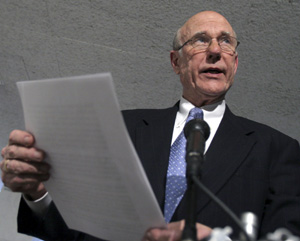| Home | Blog | Ask This | Showcase | Commentary | Comments | About Us | Contributors | Contact Us |

What about the Senate inquiry into twisted prewar intelligence?ASK THIS | July 195, 2006Minority leader Harry Reid shut down the U.S. Senate eight months ago to force the Intelligence Committee to investigate how Bush, Cheney et al handled the findings they got. Reporters should ask Reid and the 15 Senators on the committee: What’s taking so long? By Barry Sussman Q. Eight months ago Senate Republicans, under pressure, pledged to investigate and report on whether President Bush intentionally exaggerated or mischaracterized intelligence findings to drum up support to invade Iraq. What’s happened since? Q. The investigation was to be undertaken by the Senate Intelligence Committee, which, under chairman Pat Roberts of Kansas, has been a rubber stamp for the White House. There are seven Democrats on the 15-member committee. Ask them individually about what the committee is doing, what it's come up with and why it is that we hear so little from them. Q. Senate Minority Leader Harry Reid shut down the Senate to force Republicans to speed up this investigation. Ask Reid, what has happened since? How wittingly President Bush and the rest of his administration misled the American public about Saddam Hussein’s weapons capabilities in the run-up to war still remains largely a mystery. There were at one point two promising lines of inquiry. One of them was special prosecutor Patrick Fitzgerald’s criminal investigation into the leak of Valerie Plame’s identity as a CIA agent as part of an effort to discredit her husband. It had the potential to make public highly damaging details about why Bush and his aides were so obsessed with discrediting anyone who suggested that they knew the information they were disseminating was inaccurate. Fitzgerald would appear to have gathered enough evidence about conduct inside the White House to force a legal confrontation that would be devastating to Bush and to Republican election chances in 2008. But rather than do that, the prosecutor has apparently decided to limit himself to his indictment of Vice President Cheney’s top aide on obstruction of justice and perjury charges. Still viable, at least in theory, is the long-promised “phase two” of the Senate Intelligence Committee investigation. Phase one dealt with the quality of the intelligence community’s work regarding Iraq and weapons of mass destruction. Phase two was supposed to examine how that intelligence was used. Reporters should be dogging this investigation vigorously, but there's no evidence they have been. One reason may be that they've concluded it's an investigation that won't go anywhere, with committee chairman Roberts set on thwarting it. But that’s a story worth telling, not ignoring. Just this week, in fact, a Congressional Quarterly report described how the investigation is "in limbo" on account of partisan squabbles and logistical issues. The Iraq war has been terribly costly in lives lost and financial treasure wasted. The international reputation of the U.S. government is nearly ruined. If Bush hyped and cherry-picked intelligence, he would be guilty of a terribly serious offense. If he deliberately falsified it or knowingly used fraudulent reports to draw support for the invasion of Iraq, it would be worse than criminal. That’s what Roberts’s committee is supposed to be investigating. Here’s a http://intelligence.senate.gov/members.htm list of members. There are seven Democrats on the committee: Rockefeller, Levin, Feinstein, Wyden, Bayh, Mikulski, and Feingold. And there are eight Republicans: Roberts, Hatch, Dewine, Bond, Lott, Snowe, Hagel, and Chambliss. And then there is Minority leader Reid. Opponents said he was just playing politics when he shut down the Senate. Is that what it was about? On the one hand, it’s the job of Democrats and Republicans to conduct a proper probe and report their findings. And on the other hand, it’s the job of the news media to report whether that's getting done or not.
|




